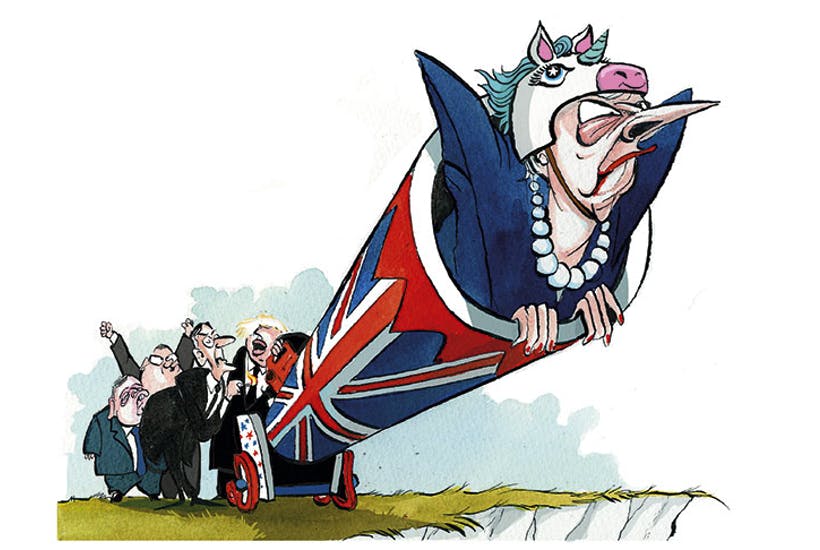Brexit is breaking British politics. Both the traditional powers have been shipwrecked by this storm and show no signs of knowing how to repair their ruined timbers. This is the sort of thing everyone understands. If the Tories enjoy more support than Labour this is only because Labour is so very bad. It is not because Theresa May’s Government commands the confidence of the people. In any case, her party is slowly but surely devouring itself over Brexit. Again, everyone knows this.
But what if we’re approaching this from the wrong direction? Instead of observing how Brexit is destroying the Conservative party, perhaps we should wonder if, actually, Brexit has both made and saved Theresa May’s Government. It might be the only thing holding it together. If so, May’s troubles will not end if or when some kind of withdrawal agreement is reached; they might just be beginning.
There are a number of ways in which we might measure this. In the first place, there is the damage Brexit is inflicting upon Labour. Jeremy Corbyn is a liability but also a Leaver in all but name and he leads a party that, increasingly, is made up of Remainers. That owes something to the distribution of votes cast in 2016 but also, almost unavoidably, to the laws of political physics which dictate that if most Tory supporters are for Brexit most Labour supporters will eventually find themselves against it. And vice versa. Partisan affiliation tugs people towards more extreme versions of their own expressed preferences.
Brexit is Government policy and so most Tory MPs, whatever their own private doubts, have made their peace with it. Most Labour MPs have not and some of those most disenchanted have already left the party. For all that Anna Soubry, Heidi Allen and Sarah Wollaston bring a measure of bipartisan plausibility to the Independent Group it remains, for now, an entity more likely to draw support form the disenchanted left than the distressed right. And while the disaffected Labour MPs could not stomach prime minister Corbyn anyway, their decision to jump was obviously made easier by the leadership’s equivocal response to Brexit. The creation of the Independent Group is a second-order consequence of Brexit but it’s also something that, at present, hurts Labour more than it hurts the Tories. In the sense, then, Brexit is good news for the Tories.
Brexit works for the party in other ways too, not the least of which is deflecting and drawing attention away from other matters which would, in more ordinary times, damn the governing party. On Tuesday, the Labour MP Jess Philips shared a letter she had received from the school her son attends, informing parents that to save money it could be closing at 1pm on Fridays. The same day, the Times reported that schools are asking parents for money to help support ordinary school activities, not just trips or other less common items of expenditure. This should not be thought a surprise. The Institute for Fiscal Studies concluded last year that since 2009-10 per pupil funding in schools in England has fallen in real terms by eight per cent. Something has to give.
Then there is the surge in knife crime, most apparent in London but also evident in other parts of England. Cuts in police numbers are not the only cause of this, though they doubtless do not help. Nevertheless, at some point resources do have to matter and this remains the case even if you generally think resources, and the promise of more of them, are not the only means of addressing any given problem. But since the Prime Minister used to be the home secretary, any increase in violent crime that began on her watch necessarily reflects poorly on her, even if you are also minded to concede that ministers are often held accountable for matters largely beyond their control.
Other matters are within the Government’s control, however. Whatever justification the freeze on benefits once had, it now begins to look less like necessary prudence and more like wilful punishment. The contrast between this astringency and the government’s enthusiasm for raising the 40 per cent tax threshold is acute. (This remains the case even if you also think too many people have been dragged into paying some tax at the higher rate.)
Every day, however, brings fresh reminders this is a Government hopelessly out of its depth. Chris Grayling has become a byword for oafish incompetence; Gavin Williamson is a peacock asked to do an owl’s job; Karen Bradley brings to Northern Ireland a level of ignorance that might be sardonically amusing if it weren’t also so depressing. Each of these ministers owes their position to the patronage of an unusually forgiving Prime Minister who treats her favourites with unfathomable indulgence. There is a whiff of something rotten here. Meanwhile, Liam Fox also remains a cabinet minister.
But Brexit overshadows all else, ensuring that matters which might in more ordinary circumstances destroy careers and hole a Government beneath the waterline seem so unusually trivial they can be accepted as just an unfortunate byproduct of Government business.
Remove Brexit, however, and this Government’s failure of purpose, its near total lack of vision, its miserable absence of ambition, will become pitifully clear. Doubtless May will enjoy some kind of bounce if or when some version of her Brexit deal is approved as a grateful nation sighs and thanks the Lord that at least this part of this interminable process has come to an end, but I fancy that will be a short-lived uptick in fortunes.
Because without Brexit to kick around – or at least without this part of Brexit to dominate everything else – attention must necessarily be drawn back to all these other failures. What is this Government for? What does it seek to achieve?
The answers to that are in some senses simple. It aims to get through Brexit and it aims to keep Jeremy Corbyn out of Downing Street. These may be necessary goals; they are not sufficient ones. All of which leads us to this unhappy conclusion: Brexit is May’s shield, the cluster-calamity that protects her. For if you remove that, what is left? To ask the question is to be reminded of its painful, gapingly empty, answer.







Comments